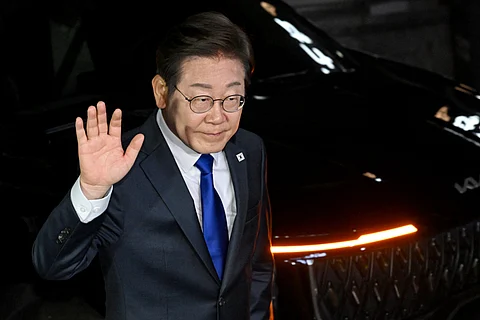
- NEWS
- the EDIT
- COMMENTARY
- BUSINESS
- LIFE
- SHOW
- ACTION
- GLOBAL GOALS
- SNAPS
- DYARYO TIRADA
- MORE

Lee Jae-myung appeared poised to secure a decisive victory in South Korea’s snap presidential election Tuesday, pledging not to disappoint voters after months of political chaos triggered by former president Yoon Suk Yeol’s declaration of martial law.
Six months to the day after former President Yoon Suk Yeol threw the country into crisis with a martial law declaration, all three major broadcasters projected a win for Lee, with voter turnout reaching its highest in nearly 30 years.
With nearly 50% of the vote counted, Lee, representing the left-leaning Democratic Party, led with 49.01%. Kim Moon-soo of the conservative People Power Party (PPP) trailed with 42.62%.
Speaking outside his home, Lee thanked supporters.
"I will do my utmost to fulfil the great responsibility and mission entrusted to me, so as not to disappoint the expectations of our people," he told reporters.
Lee is expected to assume office immediately after the National Election Commission completes the vote count and validates the results, likely early Wednesday.
He will inherit a packed agenda, including global trade challenges, one of the world’s lowest birth rates, and growing military threats from a nuclear-armed North Korea.
Voter turnout was 79.4%, the highest since 1997.
An exit poll conducted by South Korea's three major broadcasters had earlier predicted a Lee victory, prompting celebrations outside the National Assembly. Supporters erupted in cheers, and party officials inside the parliament began chanting “Lee Jae-myung.”
Lee had held a consistent lead in pre-election polls over Kim, Yoon’s former labor minister, who faced internal party divisions and failed to consolidate right-wing support by bringing in a third-party candidate.
The snap vote followed months of instability and a succession of acting leaders. Many voters expressed hope the country could now move on.
"I hope the next president will create an atmosphere of peace and unity rather than ideological warfare," said Choi Sung-wook, 68, a cab driver who spoke to AFP after casting his ballot.
Noh Min-young, 20, who had been protesting since Yoon’s martial law declaration, called the projected result a relief.
"It's been a tough road. I'm happy because it feels like we've seized the opportunity that so many people fought for over the past six months," she said.
The election was widely seen as a referendum on Yoon's leadership, political analysts said.
“The vote was largely viewed as a referendum on the previous administration,” said Kang Joo-hyun, a political science professor at Sookmyung Women’s University.
Yoon’s impeachment and ouster—triggered by his use of martial law and the deployment of soldiers to parliament—made him the second consecutive conservative president removed from office, following Park Geun-hye’s impeachment in 2017.
"Lee's victory signals that the Korean public rejects illiberal and undemocratic measures such as martial law," said Gi-Wook Shin, a sociology professor at Stanford University. "This moment will likely be remembered as a peculiar and consequential turning point in South Korea's political history."
Still, analysts noted that Lee’s win reflected both public rejection of his opponents and lingering concerns about his own record.
"Lee has a criminal record and was involved in several political and personal scandals, which made him deeply unpopular among many voters in the 2022 presidential election," said Minseon Ku, a postdoctoral researcher at the William & Mary Global Research Institute. "His rise to the presidency is a reflection of the deep political turmoil South Korea has been experiencing."
South Korean presidents serve a single five-year term.
Ballot counting began shortly after polls closed at 8 p.m. local time, with boxes arriving at central facilities including the Seoul National University Gymnasium in the Gwanak-gu district.
Election day passed peacefully in the capital, with residents enjoying clear weather and a public holiday. Police deployed thousands of officers and issued the highest level of alert to ensure order during both the vote and Wednesday’s expected inauguration.
Lee, who survived an assassination attempt last year, has campaigned in a bulletproof vest and behind protective glass.
